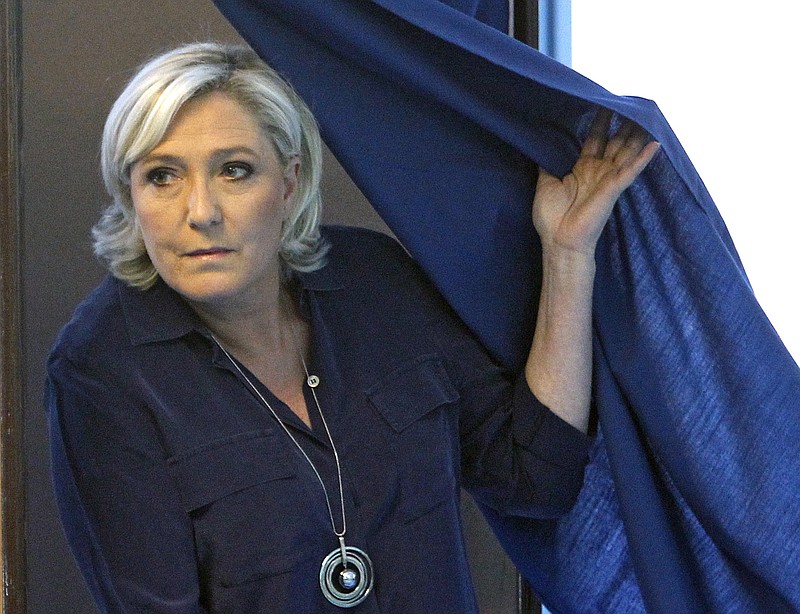PARIS (AP) - Marine Le Pen was the candidate feared by so many, with much of France shuddering when voters thrust her into the final round of the presidential race.
That was only weeks ago. Now Le Pen, who wanted to lock France's doors to migrants, Muslims, the euro currency and the European Union, is trying to salvage her far-right National Front party after it collapsed in the first round of legislative elections and is set to win just a handful of seats in Sunday's decisive final round.
The reasons her national message resonated have not gone away, and she could stage a comeback if rival Emmanuel Macron's presidency falters. Centrist Macron won the presidency in part by default, because voters wanted to keep Le Pen from power. His Republic on the Move party is now set to sweep the parliamentary vote.
Le Pen blames her party's downfall on the record low turnout rate in last Sunday's first-round election and a voting system that punishes outsiders. But she may also have to blame herself - overconfident, running a lackluster campaign and heeding bad advice, said Sylvain Crepon, a leading expert on the far-right.
The recent departure from the party of her very popular niece, Marion Marechal-Le Pen - one of two National Front lawmakers in the outgoing parliament - and infighting among party leaders can be added to the list of fails.
Le Pen once envisaged dozens of National Front lawmakers making life miserable for Macron. While some 120 far-right candidates remain in the running for the 577 seats in the National Assembly in Sunday's second round, fewer than 10 are expected to win.
"If the National Front has three or four lawmakers, it should consider itself lucky," said Crepon.
Two big guns in the party were eliminated outright - campaign director Nicolas Bay and Jean-Lin Lacapelle. Other major party figures could get the voters' ax this Sunday.
A candidate herself, Le Pen could become the lone National Front voice in a scanty opposition, and bereft of the 15 lawmakers needed to form a parliamentary group, a crucial tool to weigh on policy.
Or she, too, could lose the race to represent her northern bastion around Henin-Beaumont, where she faces a candidate from Macron's party who has allies to provide a big boost in the final round. Le Pen has none.
Since Le Pen took over the National Front in 2011 from her father Jean-Marie, she has worked to give it wider appeal, cleaning out signs of racism or anti-Semitism from its ranks and bringing new blood into leadership positions. With each election, the party's scores rose.
Her party garnered more votes than any in France in 2014 voting for the European Parliament, allowing her to crow that it was the "first party of France." Now, it's in a downward spiral, further damaged by a voting system that favors mainstream parties in elections for the powerful lower chamber of the French parliament.
Le Pen's party came in a strong third place in Sunday's first round, garnering 15 percent of overall votes. But it may win less than 1 percent of seats in the second round. That's because legislators are elected by district instead of by a system where seats are allocated according to overall support for a party.
Prime Minister Edouard Philippe said Tuesday that Macron would introduce a "dose" of proportional representation, in which the number of lawmakers is determined by the number of votes cast for a party - something Le Pen has long demanded.
Le Pen challenged the government on Wednesday to make full proportional representation the norm, saying on Europe 1 radio that without that "there will be no more pluralism in our country," just lawmakers representing Macron, and millions "who feel they've been cast aside from democratic life."
Her party was also hit by the many voters who stayed home this time. The IPSOS polling firm estimated that 57 percent of Le Pen's voters in the first round of the presidential race failed to cast ballots in the first round of the legislative vote - particularly workers and those with low income.
Trying to mobilize her voters in a TV campaign ad this week, Le Pen says, "It is essential to resist the Macron system."
The party risks being further hobbled by dissent within its ranks as finger-pointing about who is responsible for Le Pen's presidential defeat goes public. Le Pen's top lieutenant, Florian Philippot, started up a group, "The Patriots," after the electoral loss.
Le Pen insists the National Front is unified and announced plans for a congress to reinvent the party - including giving it a new name.
Making things worse for Le Pen, with a poor performance this Sunday, the party will lose financing awarded to top performers. All that seems certain is that Le Pen herself will remain the boss.
"The National Front can be marginalized, but Marine Le Pen will not be marginalized," Crepon said, adding that there is no one to replace her, for now.
Also living on are the causes that helped thrust the nationalist party forward, from immigration to the globalization Le Pen's supporters decry.
"The reasons for its emergence and development have not disappeared," Crepon said of the populist wave, fueled by Brexit and nationalist inroads elsewhere in Europe. "I wouldn't bury it as soon as that."
